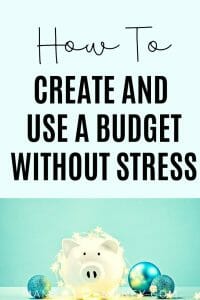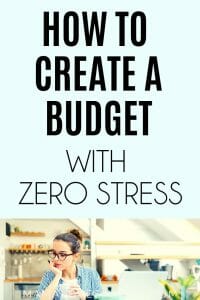Money Management 101 – How To Create A Budget With Zero Stress

Money Management 101
How To Create A Budget With Zero Stress
Want to learn the basics of money management?
Here’s exactly how to create a budget with zero stress to get you saving more money in no time!
A lot of people freak out when they hear the word BUDGET but a budget can become your very best friend on your journey to money success.
By definition a budget is a financial plan for a particular time period (usually a year).
It includes taking note of your income and expenses, assets and liabilities.
Even if you are living comfortably on the money you’re making, it’s still a good idea to use a budget because it honestly helps you manage your money even better.
Some people think that having a budget means you can’t have any fun or spend money but in reality a budget provides you with EVEN MORE financial security.
Even a tight budget still leaves room for fun and a little extra spending from time to time.
Let’s start with the basics:
When you plan a budget, you must be realistic about what you’re spending and saving.
That is the secret to a great budget!
You cannot commit to spending $10 per week on lunches if you know you will really spend $40.
You can change the amounts later and cut back if necessary, but the first step is to get everything down on paper exactly as it is right now.
That way, you can see what you’re really spending your money on.
You Might Be Really Surprised
Usually, when people set out to create an honest budget they start by tracking their spending each month.
When they write everything down they are often shocked to see how much they’re paying out each month.
It’s not just the big expense like bills, but also the little things like lunches and dinners out, coffee in the morning, and small purchases that add up.
I’m giving you some warning in advance – the results may surprise you.
So here’s your task for how to create a budget with zero stress.
For one month, I want you to keep track of every cent you spend.
Do not hide any purchases or try to sweep anything under the rug (not saying you would but still maybe the idea is tempting).
I want you to also save all of your receipts (I like to keep mine in an A4-size plastic envelope) and write your expenses down.
That includes your bills, spending money you withdrew from the bank, and anything else that was paid out in that time frame.
At the end of the month, you’ll have an accurate picture of what it’s costing you to live for 30 days.
Now for the fun (or tricky) bit:
How to Lower Your Costs
After you get over the initial shock of your tracking experiment, you’ll likely want to find ways to spend less.
There are many ways to lower expenses, and they depend somewhat on how you spend your income.
Please note: everyone’s situation is different and not every suggestion below will appeal to you.
That’s fine – just implement the strategies that seem most realistic and feasible to you.
Here are some ideas for decreasing your expenses each month:
- Adjust the thermostat by a few degrees to save on electricity or gas.
- Skip going out for lunch and coffee by bringing these things from home.
- Change to a less expensive cable TV, Internet, or cell phone plan.
- Have a yard sale to get rid of unwanted items and make some quick cash.
- Carpool or use public transit, and sell that second car.
- Buy groceries only during sales and stock up on often-used items.
I’ve always had the attitude that saving money is fun (I think that came from the experience of having two parents who saved well and were able to retire super young).
So if I could just impart that feeling to you too – that saving money can be enjoyable – then I will feel like my work is mostly done (but I’ll still keep on spreading that message anyway).
Remember – budgeting doesn’t have to be depressing and minimalistic.
Instead it is simply supposed to give you an accurate picture of what you’re already spending on, whether you write down those figures or not.
Don’t fear the flashlight!
Those numbers can’t change or improve for the better until you know exactly what you are wasting your money on.
Only then can you decide how to spend less – or if you even want to spend less – and make any changes that will benefit you in the long run.
I also recommend not feeling as if you have to copy or become a slave to another person’s suggested budget.
Nope, that’s not a thing you should do!
Sure you can check out these so-called ideal budget templates online but as long as you know that what works for one family might not work for another.
Everything should be tailored to YOU AND YOUR FAMILY’S NEEDS.
Remember the best budget only tells you what you can’t afford but they don’t stop you from buying it.
Keeping to a budget will require both focus and discipline from you.
But you can do it.
I know you can.
This post shows you exactly how to create a budget – but you need to do the work to make it happen.
Budgeting has only one rule and one rule only to follow – DO NOT GO OVER THE BUDGET and you will succeed.
If you enjoyed this post, please feel free to share it!








